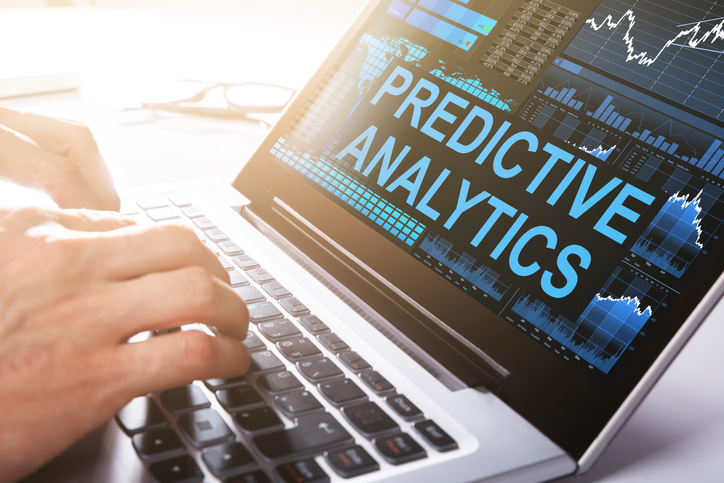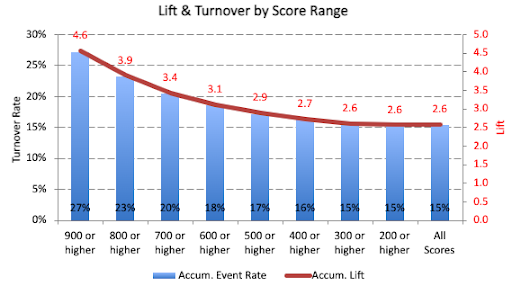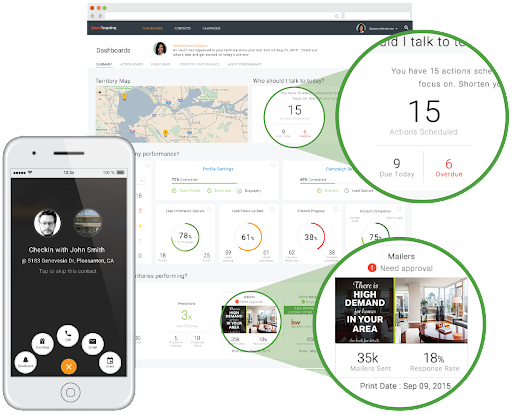How to Generate More Real Estate Seller Leads with Predictive Analytics
Real estate predictive analytics are probably your biggest competitive edge in 2022. But how do you use them as an agent? Read the full article to learn.
Some parts of real estate marketing and sales don’t change much over time. Friendly and reliable service, clear communication, and recommendations from friends and family members will always be powerful tools for growing a real estate business.
However, digital and traditional marketing offer an enormous opportunity for real estate agents to expand their reach and deepen relationships with seller prospects.
There’s just one problem: how do you know which sellers to target?
What if there was a way to see and use all of the data on potential sellers in one place? Even better, what if there was a tool that scored each homeowner in your territory by their likelihood of listing?
The answer to this dilemma is SmartZip, a real estate marketing platform powered by predictive analytics. SmartZip gives agents total clarity on listing leads within a specific, customized geography and helps them conduct precise, targeted marketing efforts.
This article will cover exactly how predictive analytics can be combined with homeowner data to accurately estimate which prospects will sell their home, giving agents early indicators on who to target and real-time insights on prospects. While the conversation might get a little bit technical, we recommend reading on to understand exactly why predictive analytics tools like SmartZip should be your biggest advantage for finding seller leads in 2022.

Image Credit: Mashvisor
What are Predictive Analytics in Real Estate?
Let’s start by explaining what predictive analytics are, and the different systems, information, and processes that each play a part in “predicting the future.”
Huge amounts of data, sophisticated algorithms, and machine learning are all required to make “predictions” about the likelihood that a homeowner will sell their property.
These predictions are made by understanding what factors influence people to sell their home, gathering information on those factors (data points), and analyzing what data points would indicate that the same thing is going to happen again.
In real estate, relevant data points might include how long someone has lived at their current address or how much their home has appreciated in value. Companies like SmartZip have created proprietary algorithms that can use this type of information (over 25 different data points, actually) to assess how likely someone is to sell their home.
If this seems a little bit confusing, don’t worry. Later in this article, we’ll break down real life data that shows how predictive analytics is used in real estate to accurately predict more than 70% of new listings.
For now, let’s add some context to each of the part of the predictive analytics process: data, algorithms, and machine learning.
Data
Predictive analytics relies on having good data, and a lot of it. This data needs to tell a story about why certain things have happened in the past. It needs to reveal why people make certain decisions, and when.
Imagine that you’re standing on a residential street and looking at addresses you’ve been actively farming for a few months. Think about what information would be useful to know before you knock on each door.
What would be on your data wish list?
How about any of the following:
· Who just refinanced their home?
· Who requested a home valuation from an online website?
· Who experienced a life event like death or divorce?
· Who experienced a negative credit event?
Knowing the answers to these questions would almost certainly cause you to reprioritize your prospect list and change your sales conversations. SmartZip collects a huge amount of homeowner data from over 25 different sources, and we analyze information from over 122M+ properties across the country.
This data includes:
· Total time in home.
· Number of residents.
· Home appreciation.
· Consumer habits.
· Age of home.
· Loan status.
· Much more...
Each of these individual data points helps us create a full picture of the actual real estate market in any geography.
Proprietary Algorithms
An algorithm is simply a way of weighting different data points based on assumptions that have varying degrees of certainty. But, if terms like “proprietary algorithm” leave you with a blank stare, that’s OK.
Here’s an easy way to think about what algorithms do and why they’re important.
Assume you know three important things about one of your prospects:
· They’ve recently requested a home valuation.
· Their home has increased 20% in value over the past 12 months.
· They are actively browsing several real estate websites.
How do you know which one of those activities is most important?
Algorithms are used to weight different information based on how important it’s assumed to be. So, if an increase in home value is the most significant indicator that someone might sell their home, then it should carry more weight than, say, visiting a website like Zillow.
In real life, this might be equivalent to attending open house in a neighborhood you’re farming and noticing that one of your prospects is visiting the home that’s for sale. Based on experience, you know that visiting an open house strongly indicates that your prospect is very interested in selling their home.
Unfortunately, without technology like SmartZip there’s simply no way that you can keep tabs on each prospect’s activity, especially since most of their information gathering happens online.
SmartZip uses algorithms that they’ve developed to make the best possible predictions based on all available data.
Let them do the heavy lifting!
Machine Learning
Machine learning is a trending topic, and you’re probably hearing about it more than ever before. Essentially, machines are now able to understand how well programs and systems are working even better than humans.
Over time, machine learning can identify how algorithms perform and continually refine the process to produce better results.
This is part of the secret sauce that makes Smart Data so accurate and reliable for agents. Our data is continually assessed for accuracy and it only gets better over time as it’s fine-tuned based on what has been proven to work.
The Results
The case for predictive analytics is compelling, but what are the actual results?
We’ve looked hard at our results to determine their accuracy and the overall performance of our predictive analytics when compared to average real estate market performance.
Here’s the gist:
· We were able to predict 72% of home listings in the United States last year.
· In total, agents targeting only the highest scoring prospects in our system could have experienced turnover at 27% compared to the national average of 5%. Imagine the impacts to your business with 4.6x the results of your competitors.
Below is a snapshot of the actual data from our system after it was collated and analyzed by our data team:

Image Credit: SmartZip
We get it, you’re not a data scientist. This is what each of the terms used in our report actually mean:
· Lift. The difference between our predicted turnover and the national average.
· Accumulated event rate. A fancy way of saying “turnover rate,” or the pace at which houses are listed for sale. This needs to be compared to the national average turnover rate, which is 5%.
· Property distribution. How many homes in a specific area reached which score range? In the example below, 4% of properties reached a score of 900.

Image credit: SmartZip
Harness the Power of Predictive Analytics in Just a Few Clicks
Even with great data and accurate predictions, you still need a platform that makes marketing execution simple and targeted, without a dollar wasted. SmartZip provides the data and tools to make your real estate farming more focused than ever, including:
· Easily create and launch branded online ads in minutes.
· Use a customized testimonial website to drive more referrals and word-of-mouth business.
· Handpick your farming territory with an interactive online map, then drill down into individual homeowner insights.
· Send branded, personalized direct mail once or on an automated schedule. · Engage with leads using an automatic email drip campaign.
If you want to see everything SmartZip can do, and how predictive analytics can be your competitive edge, request a demo today and start growing your business.



